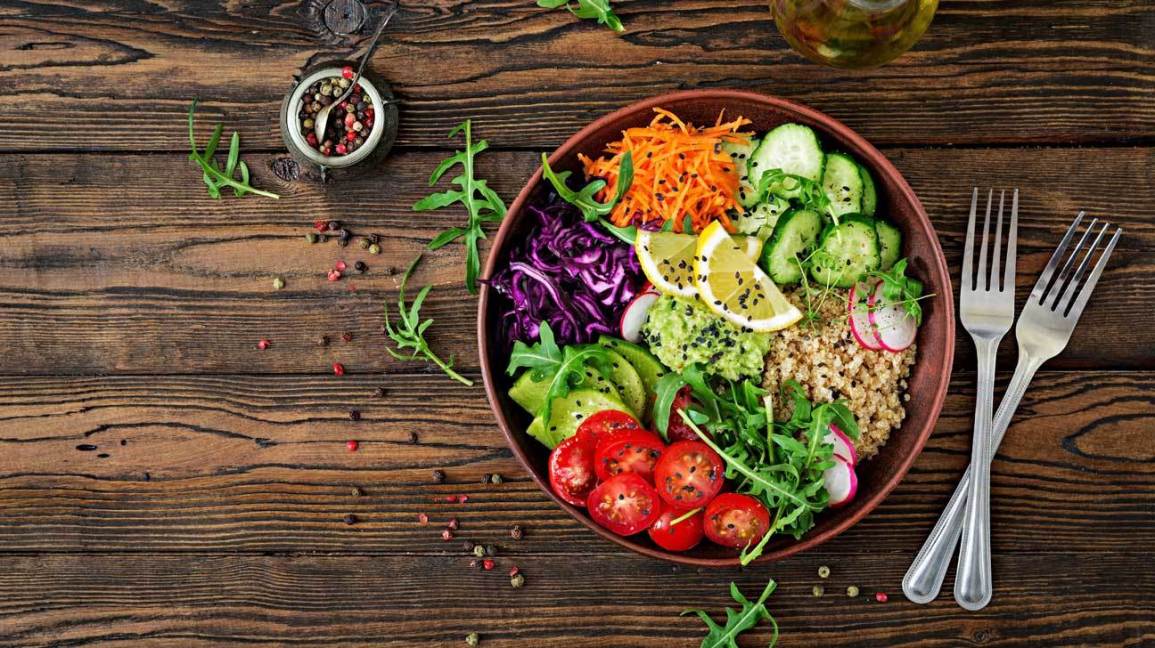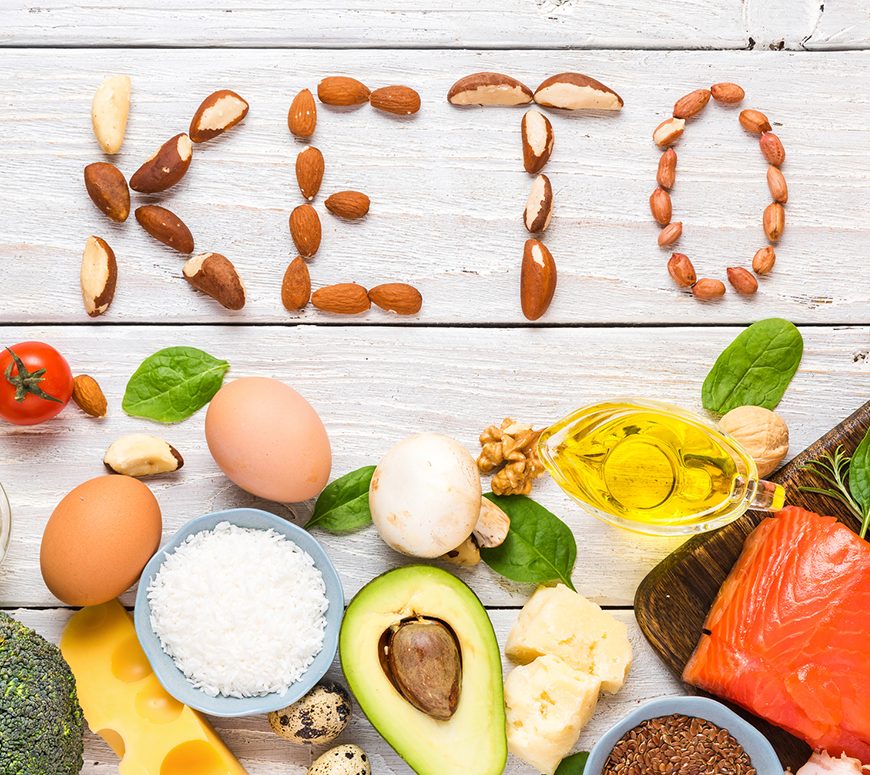This blog is part of the All About Fad Diets blog series. They’re not really fads, but more like lifestyles.
Types of Vegetarians:
Lacto-Ovo Vegetarian
Eat dairy products and eggs. This is the most common type of vegetarian, as many as 10% of the population in NZ.
Lacto-Vegetarian
Eat dairy products but omit eggs.
Ovo-Vegetarian
Eat eggs but avoid dairy products.
Pescatarian
Eat fish, and possibly dairy products and eggs.
Do not eat dairy products, eggs or any animal derived products.
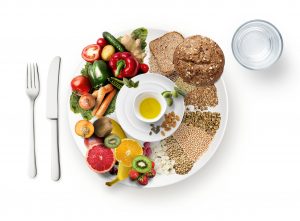
Pros
Fruit and Veggies
More likely* to eat more vegetables and fruit. Plants contain more phytonutrients, antioxidants, and they are more alkalising.
High Fibre
More likely* to have a higher fibre diet. This supports bowel health, lowers cholesterol, a promotes a healthy weight.
Live Longer
More likely* to live longer. But for many people value quality over quantity. Would you rather live a slightly shorter life enjoying meat or a slightly longer life depriving yourself of bacon? (Vegetarians, don’t take offence!)
Reduced Risk of Cardiovascular Disease
Vegetarian diets are known to reduce blood pressure and high cholesterol. Plant-based diets are usually higher in potassium-rich fruit and vegetables which help to lower blood pressure.
However, in general, the average vegetarian is healthier than the average meat-eater because they are more conscious about their health. Hence why they made the diet change in the first place. If we compare healthy vegetarians and healthy meat-eaters (who also eat a rainbow of fruit and veggies, don’t drink alcohol or smoke, and care for their health), it may be a photo finish. The research isn’t undertaken on an even playing field.
*Note ‘more likely’ because we are assuming that the person is eating a relatively healthy diet. An important point to realise is, a healthy-eating meat eater is healthier than an unhealthy-eating vegetarian.
Lower Risk of Cancer
The Cancer Society state eating large quantities of red (and processed) meats can increase the risk of some cancers, particularly bowel cancer. Despite iron being an essential nutrient, when broken down haem iron (animal-based iron) damages nearby cells, enabling cancer to develop more easily. Additionally, cooking meat at very high temperatures and burning/charring meats creates heterocyclic-amines which can cause stomach cancer.
The Cancer Society recommends a moderate consumption of less than 500g of red meat per week – a 65-100g serving no more than 3-4 times a week.
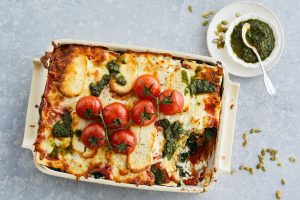
Cons
There are many important nutrients that may be difficult to obtain in a vegetarian diet.
Vitamin B12
The only vitamin or mineral found in animal foods e.g. meat, seafood, eggs, and dairy products. Vegetarians may be able to get enough through diet but deficiency is still common. This is largely dependent on how often you eat eggs and/or dairy. Trace amounts of vitamin B12 are also found in seaweed, fermented soy (e.g. miso, tempeh and natto), spirulina and nutritional yeast, however, these small quantities are not sufficient long-term.
There is a theory that vitamin B12 used to be present in plant foods in the form of tiny little insects on un-washed produce. However, we cannot rely on these insects as a source of vitamin B12 anymore due to pesticides.
Vitamin B12 is required for the synthesis of DNA and red blood cells. It is vital for the nervous system and it plays a role in heart health. Deficiency can result in anaemia due to its involvement in red blood cell formation.
Vitamin B12 is the only B vitamin that can be stored in the body, in the liver. Our vitamin B12 stores will last us for the most of 3-5 years until they exhaust. If vegans stick to their lifestyle for that long, and even people who eat limited animal products in their diet, symptoms may only become apparent after this amount of time. While enthusiasts may feel like they have a new lease on life in the short-term, consider supplementation to prevent chronic deficiency in the long-term.
Iron
A well-known deficiency in vegetarians. Animal sources of iron contain haem-iron, which is much more easily absorbed than non-haem iron found in plant sources. Iron is the main nutrient required for the production of red blood cells, which carry nutrients and oxygen around the body. Iron deficiency commonly results in anaemia, which is experienced by most vegetarians at some point.
Women lose up to 50mg of iron per month through menstruation! While men only lose around 1mg per day through sweating and shedding of skin cells.
Highly absorbable (haem) forms of iron include liver, red meat, chicken, and eggs. See below for plant sources.
Is difficult enough for meat-eater to obtain, let alone those on a vegetarian diet. This is not so much of an issue for pescatarians.
In order from highest to lowest, zinc is found in oysters, crab, pumpkin seeds, beef, lamb, mussels, chicken, prawns, chickpeas, and brown rice.
Zinc is important for immunity, skin health (especially hormonal acne), wound healing, hormones, stomach acid production, and growth/repair/maintenance of muscle mass.
Zinc is deficient in our soils – along with iodine, selenium and magnesium.
B Complex Vitamins
May be more difficult for vegetarians to obtain through diet.
B vitamins are found in a wide range of foods including vegetables, grain, legumes, dairy, eggs, and meat. However, animal sources are richer sources.
B vitamins are water-soluble, therefore, not stored in the body. It is important to consume them on a daily basis, similarly to vitamin C. B vitamins play the largest role in energy production and turning our food into usable energy. Many followers of a vegetarian diet suffer from low energy due to nutrient inadequacy.
Check out my Energiser Bunny Tonic.
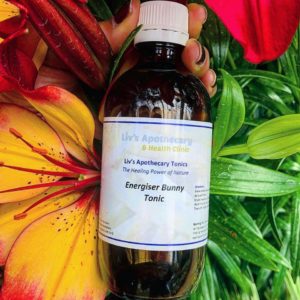
Omega 3
An essential fatty acid that cannot be synthesised by the body. It is found in the form of alpha-linolenic acid (ALA) in plant foods. This must be converted into the active forms (EPA and DHA) in the body. It is far more efficient consuming omega 3 in its active form, as it improves utilisation.
Plant sources of omega 3 are chia seeds, flaxseeds/linseeds, hempseeds, walnuts, pecans, and their oils i.e. flaxseed oil and hempseed oil. This is not so much of an issue for pescatarians as they can source their omega 3 from fish.
Omega 3 supports learning, memory, and brain function (our brain contains a lot of DHA). It is anti-inflammatory, and reduces blood pressure, cholesterol and heart disease.
You’re thinking isn’t cholesterol bad?
Cholesterol is only found in animal foods e.g. eggs, meat, seafood, and dairy products. Plants contain phytosterols – a cholesterol-like compound that is not true cholesterol.
Over liver synthesises approximately 80% (1,000-1,400mg per day) of the cholesterol in our body and the remaining 20% (300mg is the RDI) comes from our diet. Our liver has an intelligent feedback mechanism which regulates our own body’s cholesterol production, in response to our dietary intake. In simpler terms, when we eat more cholesterol, our liver down its production, and vice versa.
Vegetarians may still be deficient in cholesterol despite liver production.
Cholesterol is present in every cell in the body. It provides structure and stability to our cells. Most importantly, cholesterol is a precursor (raw material) to vitamin D, stress hormones and sex hormones (oestrogen, progesterone and testosterone). Low cholesterol can result in low vitamin D and sex hormones in the body. Low testosterone is more common in vegan males than omnivorous males.
The answer to the first question is… No, cholesterol is essential for life.
It becomes a problem when our HDL (‘good’ cholesterol) and LDL (‘bad’ cholesterol) ratio is disproportionate. The total isn’t too much of an issue, it is the variance between the two.
There is actually only one type of cholesterol, not good and bad cholesterol. High-density lipoprotein (HDL) and low-density lipoprotein (LDL) are the names of transporter vehicles. HDL is known as the good guy because he transports cholesterol from the blood back to the liver to be excreted out of the body. Oppositely, LDL is known as the bad guy because he transports cholesterol from the liver and deposits it in the arteries.
Protein
Made of ‘building blocks’ called amino acids. Amino acids in different combinations form all of the proteins in our body including muscles, bones, blood cells, skin, hair, and nails. Foods are either classified as complete or incomplete proteins.
All animal sources are complete proteins e.g. meat, seafood, eggs, and dairy products.
Plant sources are incomplete proteins. For this reason, variety is key for vegans. When plants are combined, they form complete proteins.
Traditional cuisines naturally have combined foods in this way for hundreds of years. It’s likely they instinctively knew about complete and incomplete proteins. A common combination is grains plus legumes e.g. Indians eat dahl and rice, and Mexicans eat kidney beans and corn.
Someone on a vegetarian diet must ensure to eat a variety of plant foods including grains, legumes, nuts and seeds, every day. They do not necessarily have to be eaten together in one meal, just over the period of one day.
Junk Food Isn’t Omitted
Most junk food is still vegetarian e.g. white bread, cereals, muesli bars, cakes, biscuits, and fries. These foods are processed and refined carbohydrates. If you are vegetarian, eat a wholefood vegetarian diet. Rather than anything and everything that is vegetarian.
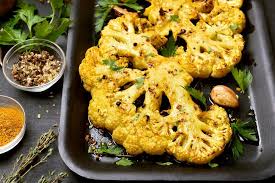
Liv’s Recommendations
Recommendations for Staunch Vegetarians
Iron
In order from highest to lowest, plant sources of iron are soybeans, tofu, molasses, lentils, dried apricots, tempeh, kidney beans, spinach, silverbeet, and kale. More of these foods need to be eaten in comparison to red meat, as less iron is absorbed from plant foods. If you eat eggs, this is a good source of iron on a vegetarian diet.
Chlorophyll
Is molecularly similar to haemoglobin (red blood cells). They carry oxygen in our blood. Spirulina, chlorella and other green vegetables are rich in chlorophyll. Spirulina and chlorella can be taken in tablet or powder form. Spirulina supplementation is known to assist bringing haemoglobin levels back up to within the normal range.
Vitamin C
Enhances iron absorption. Source of vitamin C in order from highest to lowest are camu camu (powder or supplement), acerola cherry (powder or supplement), guava, capsicum, blackcurrants, kale, kiwifruit, broccoli, strawberries, orange, lemon, rockmelon, grapefruit, blackberries, and tomato. Vitamin C is water-soluble and destroyed by heat. Try to eat more vitamin C-rich foods raw than cooked.
Phytates/Phytic Acid
A naturally occurring plant constituent found in grains, legumes, and to a lesser extent, nuts and seeds. This compound acts as an enzyme inhibitor to prevent the plant from germinating prematurely. Without phytates, these plants would start growing in our pantry before you’re ready to eat them!
However, phytates reduce absorption of iron, zinc, calcium and magnesium.
Soak and sprout/activate grains, legumes, nuts and seeds where possible to increase mineral absorption. Different plant foods require different amounts of time to soak and sprout/activate. Soaking in a splash of apple cider vinegar or a pinch of salt in the water is known to further assist drawing out phytates.
Some foods are better to sprout and some are better to activate e.g. sprout legumes (chickpeas to make raw hummus) and activate nuts (‘activated almonds’). Grains and legumes are more commonly sprouted, whereas, nuts and seeds are usually activated.
Tannins
Occur naturally in tea, coffee, and chocolate. This plant constituent hinders iron absorption. One study showed that coffee decreases iron absorption by 34% and tea decreases iron absorption by 64%! Drink/eat tannin-rich foods at least an hour separately from iron-rich foods to maximise absorption.
Insoluble Fibre
May bind to iron and inhibit its absorption, when taken excessively. Limit bran, psyllium husk and fibrous flours, when eating iron-rich foods.
Blood Loss
From menstruation. Women of menstruating age are at greater risk of anaemia. Other conditions involving blood loss include accidents or inflammatory bowel disease (blood in stools).
Supplements
Recommended are vitamin B12, iron (for menstruating women), zinc, algae oil (omega 3), and possibly protein powder. Vitamin B12, iron and zinc can be obtained from a good quality multivitamin/mineral (not all multis contain iron so check the bottle). Vitamin D is strongly recommended to everyone living in NZ in winter, as we are too far away from the sun to get a sufficient amount. Other supplements may be required depending on the individual.
“Don’t be a pastatarian” Mark Sisson, The Primal Blueprint. These are the vegetarians who survive on pasta, rice, bread, cereal, crackers, and packet foods (a.k.a. carbs). If you eat a vegetarian diet, eat real food first and foremost (before pasta!).
“Mum and Dad, I’m Vegetarian” Says Every Second Teenage Girl
Vegetarianism is not a healthy or even efficient way to lose weight, but it is often the first proclamation someone (usually a female) will make to begin attempting. You will probably eat less calories just because there are less food options. Most junk food isn’t vegan and eating and eating out is more difficult.
A vegetarian diet features more carbs and less protein. Animal foods are naturally rich sources of protein and fat. Protein and fat are satiating and stabilise blood sugar levels. A vegetarian diet may result in fluctuating blood sugar levels, creating a blood sugar rollercoaster of either feeling stuffed or starving. There is not much time feeling normal in-between. But when the time comes (it will come quickly) you will not feel hungry, but hangry! When your meals are less filling, you are more likely to snack between meals. Snacks are not always healthy. Especially when you are hangry, you will grab the most convenient option.
If you are vegetarian, focus on including more protein and fats e.g. avocado, nuts, nut butters, seeds, legumes, oils (olive, avocado, coconut, flax, hemp), protein powder, and include (if you eat) eggs, full-fat dairy and oily fish.
Make sure you (or your daughter) are choosing a vegetarian lifestyle for the right reasons e.g. sustainability or animal rights. Not because your friends are on the bandwagon, influencers on Instagram are being paid to promote it, or it’s the latest diet with Kylie Jenner’s face on the front.
Think twice before you (or let your teenage daughter) go vegetarian. It is not a decision that should be taken lightly. Weigh up the pros and cons. Make sure you are doing it for the right reasons.
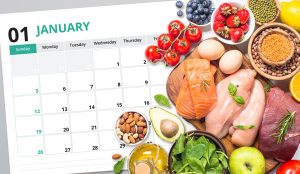
To Wrap It Up
With a keto, Paleo, primal, Mediterranean, vegan, vegetarian, gluten-free, dairy-free wrap of course (or not if you’re intermittent fasting!).
The purpose of this series of blogs isn’t to choose a diet to follow. It’s to inform you of the pros, cons and my recommendations, if you do choose to (or already) follow one of these diet trends.
I personally pick and choose what I like, and more importantly what suits my body, from each diet to create my own personalised diet. My motto is “Realigning Nutrition with Intuition”. Try N=1 Self Experimentation.
Intuition is now totally disassociated from Nutrition. We don’t eat what or when we feel like eating. We eat what and when we are told we should be eating. Realigning Nutrition with Intuition means being in-tune with your body and rediscovering what diet/lifestyle is most suited to you. As I trained as a Naturopath and Holistic Nutritionist, I am not about strict plans. That is for you to decide for yourself.
There is no one-size-fits-all baseball cap when it comes to diets.
Your Nutrition Mentor,


